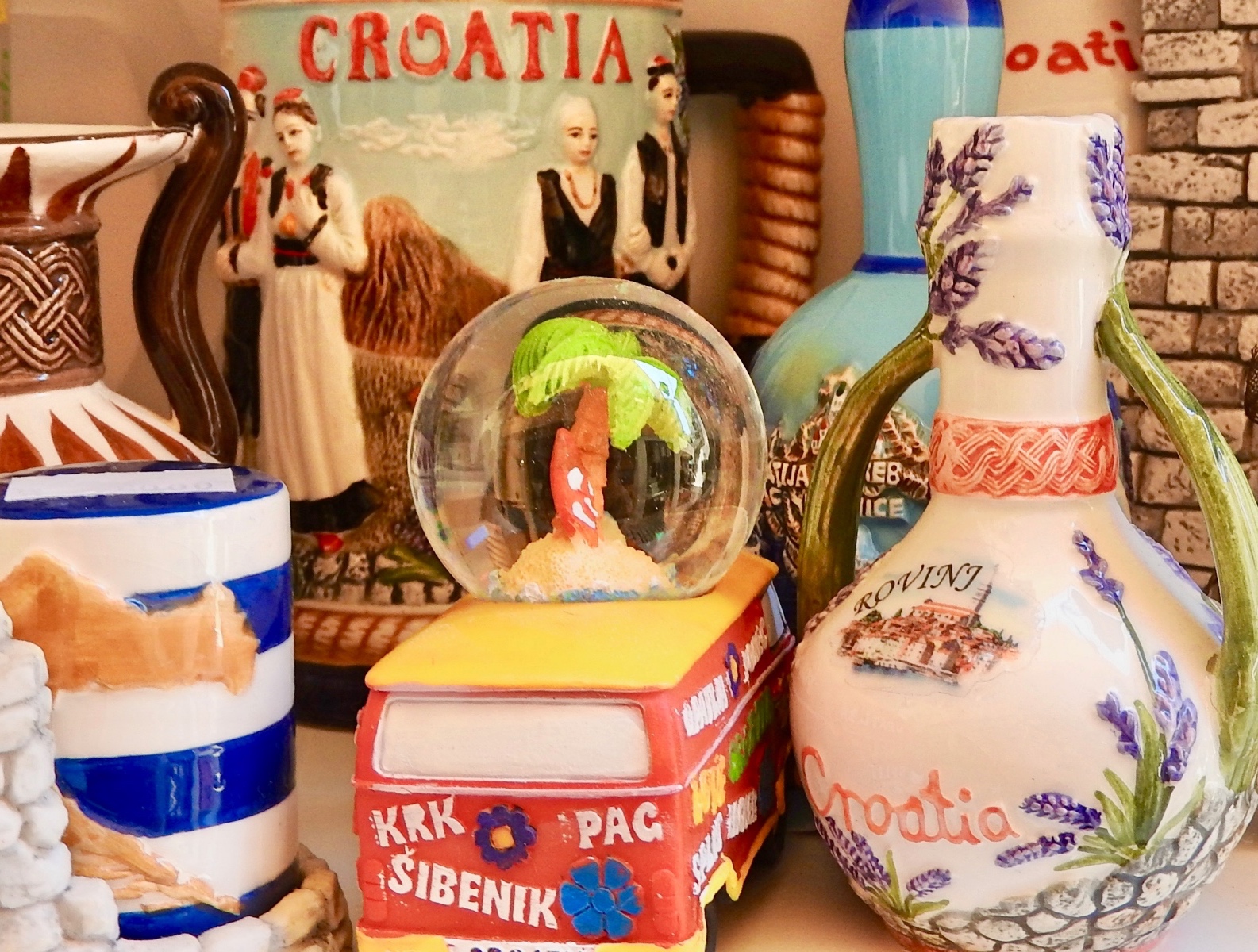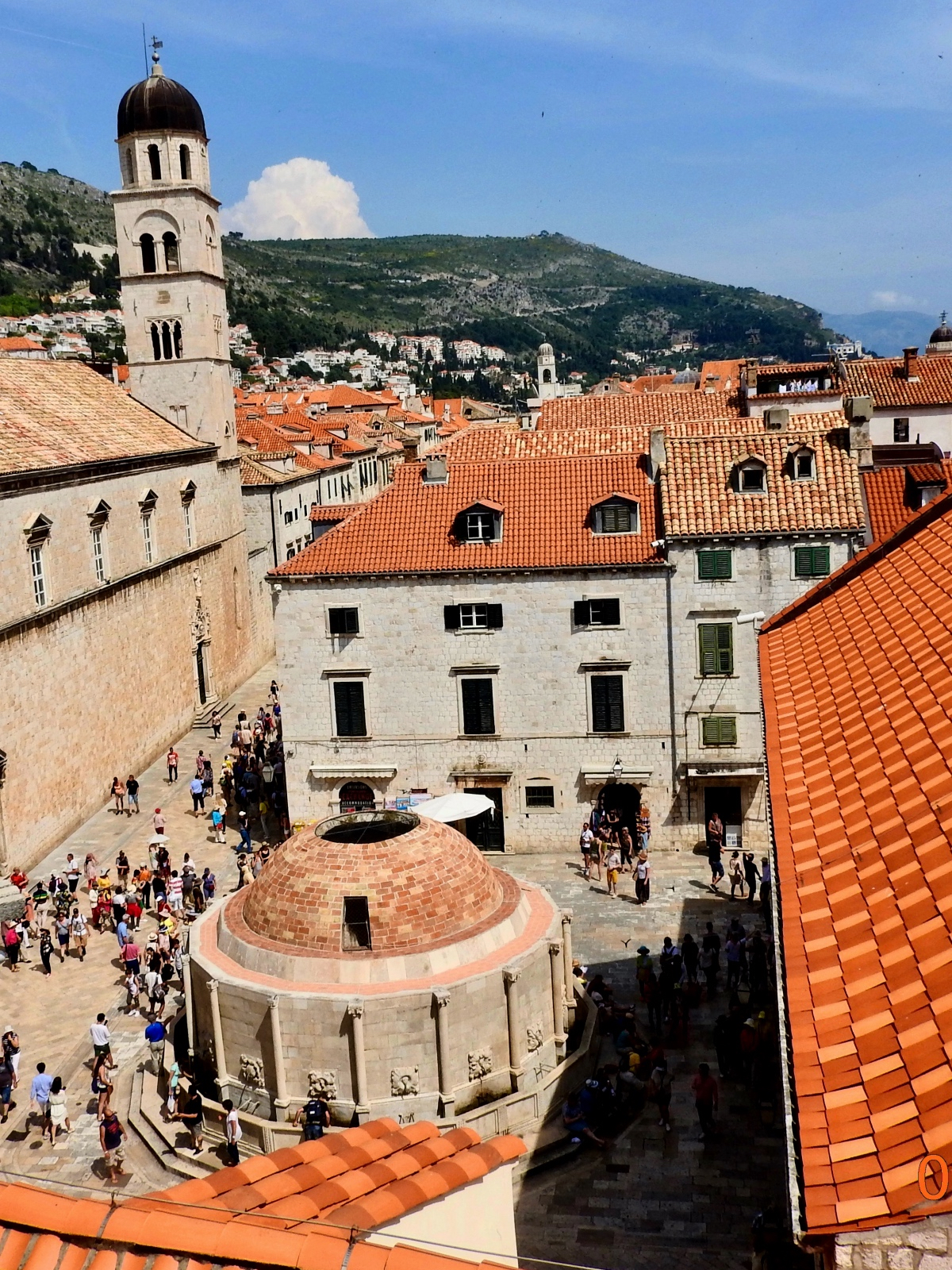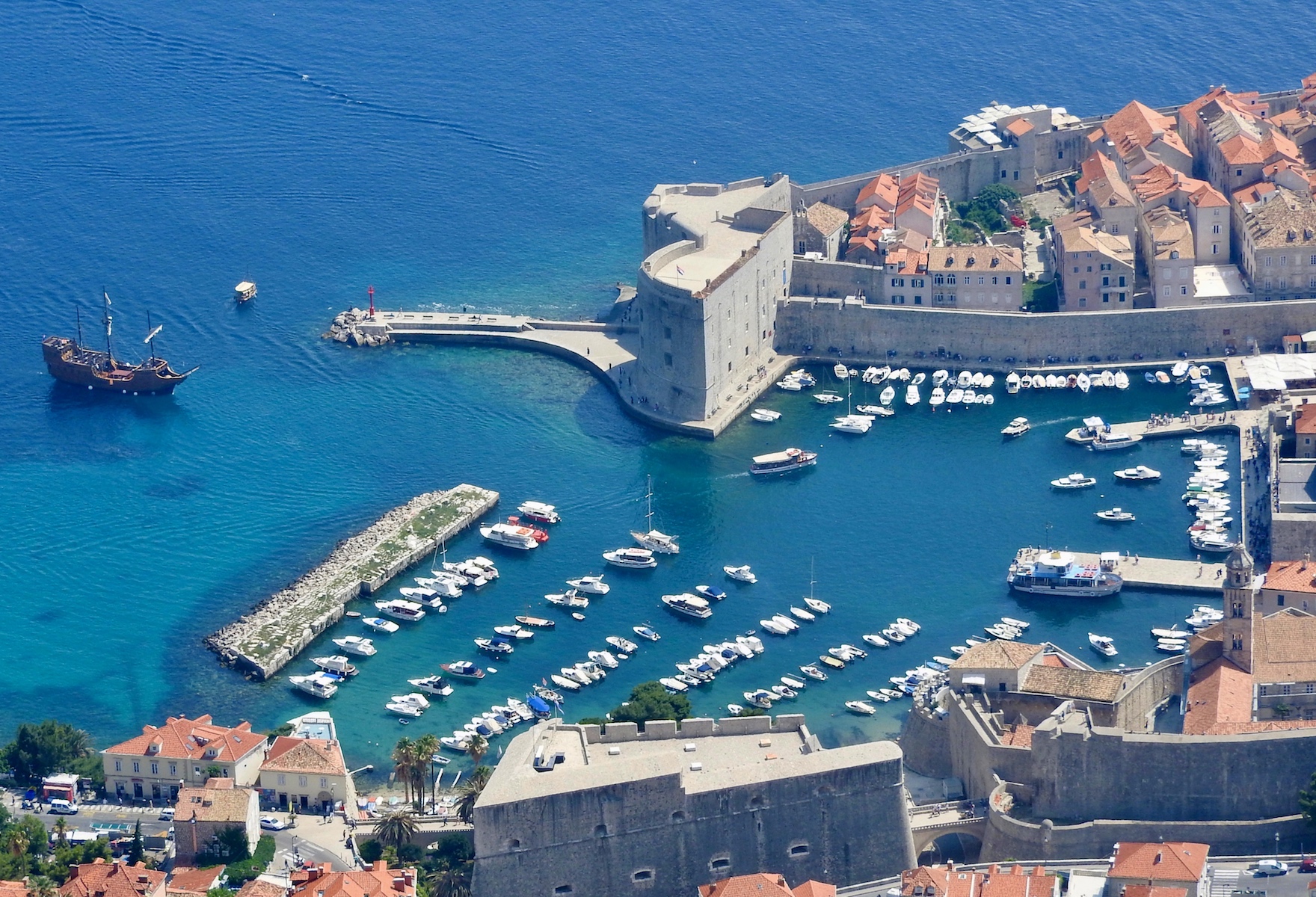
A friend once said to me, “You’ve traveled so much, I bet you don’t even know how many countries you’ve visited.” I shrugged and pretended she was right. But I knew. I knew exactly.
As I suspect is the case with many other compulsive tourists, I keep a list of the countries I’ve entered. I started counting in 1968, when I left the U.S for the first time as a Peace Corp volunteer to Kenya, and of the 193 nations with seats in the UN, I have visited 50. The number isn’t extraordinary, but it pleases me. Or at least it used to. It cost me many days of jet-lagged, foggy-headed, new-city wandering, and I have always insisted to myself that my travels have broadened my sense of the world. But since my errant visit to Bosnia, I’m no longer sure that’s true.
I keep my list of countries high on a closet shelf folded into my copy of Patricia Schultz’s fat compendium, One Thousand Places to See before You Die. (I’m at 214.) With it is a passport that expired in 2010, a document recording my travels to so many countries that I had to return it to the State Department in 2007 to have additional leaves attached. Each page is covered with stamps or stickers or stapled visas, and I recall my self-satisfaction whenever I stood before a frustrated customs officer who thumbed through page after page, looking for a place to add one more rubber stamp to the array of destinations already before him. That iconic blue American passport doesn’t define me, I told myself. I am so much more than an American; I am an international traveler, a global adventurer, an economy-class Odysseus. I am a Citizen of the World.
But there’s a question I’m now asking myself: What exactly constitutes visiting a new country? When can I add to the list? Do I count my trip to Tahiti in French Polynesia? An exotic destination for sure, but by international law I was visiting France, and since it is located exactly 12 time zones from Paris, the French don’t even reset their wristwatches when they arrive. And there’s also my obsessive visa-collecting behavior when I walked the bridge over the Zambezi River leaving Zimbabwe and entering Zambia for no other reason than to have my passport stamped. I remember a vertiginous view of Victoria Falls and an unpredictable return trip in a rusty Datsun taxi with an engine that only came to life when the driver joined two wires that hung from the dashboard, but have I really visited Zambia?
I have one traveler friend, an ever-contentious guy, who seems perpetually dressed in comfy, long-flight sweats and shoes easily slipped off for TSA scanners. I always imagine him with one hand grasping a carry-on spinner-bag. He once asked me straight out, “Tell me, how many countries have you been to?”
I was shocked by his blunt curiosity. Important as it is to me, my list is my secret, a private matter, like my salary or my weight. How could a fellow Citizen of the World pose such a crude question? How could he display such a lack of sophistication? But I answered him with whatever my number was at the time.
“62,” he replied with a raised eyebrow. “Gotcha beat!”
“Wow, that’s great,” I said with no conviction. Then, like a righteous fifth-grader confronting a bully on the playground, I challenged him. “How do you count them?” I said. “Legal entries, right? Passport stamps.”
He looked annoyed, ignored my question and started a long tale about a rude customs officer on a recent trip to Nepal. Clearly he’d been padding his count. He was a cheater who included every place a plane he’d flown had touched down.
I remembered my brief sojourn in Reykjavik, Iceland, where a charter flight in the 1970s landed to refuel. I would never consider including Iceland on my list. Clearly, I was superior to this crude braggart. But what about Vatican City? I’ve seen the complacent angels on the Sistine Ceiling and the Laocoön’s struggle against divine power, but does a 100-acre religious enclave really count as a country? And Monaco. I definitely saw an exit for the principality as I cruised the autostrada between Genoa and Nice, but did I cross its border? I’m not sure whether I should add it to my list or not.
The conversation with my hoaxer-friend made me realize that I needed some standards. I pondered this issue for months and decided on two requirements to have visited a country: First, I needed a legal entry and second, I had to have a witty or adventurous story to take home to admiring friends. So Bolivia, where a wandering flight itinerary took me south from Peru before I flew back to Miami, doesn’t count. Legal entry, but no story. And Tanzania doesn’t count. My oddly nationalistic Kenyan guide had walked me to an invisible line in Maasai Mara Game Park and invited me to pee into neighboring Tanzania. I crossed into Tanzania and peed back into Kenya. So I had a story, but no legal entry.
So I’ve given my list a lot of thought, and I’ve created standards. But not long ago I took a trip to what was once Yugoslavia and got lost in Bosnia. Since then I’ve stopped counting.

My journey started simply enough with a drive from Split to Dubrovnik, both in Croatia. My yellow Suzuki Swift rental was living up to its name, and my recurring American anxiety about a stick-shift had faded in the soothing sunshine. I whizzed across an autocesta so smooth and so traffic-free that U.S. interstates should crumble with envy. I was at the top of my tourist game with no fussy tour-bus co-travelers and no annoying guide to direct my interest or redirect my impulsive sightseeing inclinations. I was making good time, and the prospect of Dubrovnik, an Adriatic tourist mecca, lay before me.
The route? No problem, I thought. My iPhone was mounted on the dash and the imperturbable Siri, with her mellifluous voice and her GPS certainty, assured me of the shortest, speediest route. I would just adhere to her unobtrusive urgings and follow the familiar blue line that I knew led straight to Dubrovnik and the comfortable apartment I’d reserved behind the city’s ancient walls.
My mood was so euphoric that my mind drifted. I’m not sure whether it was thoughts of a tasty dinner or Diana Krall’s seductive American voice from the CD player, but I completely missed Siri’s faithful reminder that my exit was approaching in two kilometers. I also missed her warning of the exit in 500 meters and her final exhortation to take the next off-ramp. I zoomed happily forward, anticipating and indulgent evening downing fresh Dalmatian lobster and sipping slivovitz.
After a few moments, I wondered if perhaps I’d missed my exit. Never mind, Siri would reroute me.
The tires hummed on the even pavement, but now the highway signs acquired odd, unexpected names: Čapljina and Stolac and Trebinje. What happened to Dubrovnik? Where was Siri taking me?
I touched the “repeat direction” icon, but she didn’t respond. I tapped a second and third time, and it dawned on me that Siri’s faithful voice had failed me. She was gone. There were no more directions, not a word of guidance. A moment later, Siri’s ever-dependable map vanished from my screen. Exits, roads and town names all evaporated, replaced by a vacant grid. According to my muted iPhone, I was driving across a vast sheet of beige graph paper on a lonely blue line that directed me mysteriously forward.
I recalled the cautious internet search I made before leaving home. Yes, I had assured myself, Croatia would supply Siri’s turn-by-turn navigation. Wherever I went, she would show the way. But then I had a darker thought: Perhaps I was no longer in Croatia. How close to the border had I been? I tried to recall my mental map of what was once Yugoslavia. I knew Croatia was the old country’s shoreline, the area that was a haven for tourists from all over Europe. And just inland, I remembered, was Bosnia. The name made me shiver.
For the first time ever, I didn’t know what country I was in. I was a world traveler, a counter of countries, a Citizen of the World, and I was lost. Tourist-friendly Croatia had vanished. I grew suddenly nostalgic for what I had seen the previous days: Roman ruins, ancient cathedrals and most of all, the inviting and vibrant blue of the Adriatic.
As I drove, the terrain changed, or perhaps I imagined it changed. The scenery looked sparse, arid. Green turned brown and plants appeared to struggle in the heat. Life seemed to have given up in this place, yet there was a kind of mournful and austere beauty to it.
Five minutes. Ten. Fifteen. Two lanes in each direction, a rocky median strip, and no way to turn around. The blue line on the iPhone grid pointed through the barren landscape outside my windshield.
Finally in the distance, I saw a gray structure spanning the highway. I approached, and it became a border crossing, an imposing mountain of concrete and steel designed to intimidate tourists, smugglers and perhaps invading armies. I pulled cautiously into one of its gates and looked up at a swarthy man with a gaunt, no-nonsense face and a crisp uniform who spoke a word he expected to be universally understood.
“Pasoš!”
I dug through my pockets and handed over my blue passport. Surely, I thought, he’ll be impressed when he sees how many places I’ve visited. He’ll welcome a cosmopolitan sophisticate like me to his homeland.
“Where am I?” I asked hopefully.
He twisted his mouth and pointed at a slack flag on a pole just ahead. It looked familiar, but I wasn’t sure: Bosnia? Croatia? Montenegro? I made out some stars, a blue background and a yellow triangle. I was pretty sure the Croatian flag was mostly red and white. The man gave my passport a firmly officious stamp and handed it back. The look on his face said he was through with me. Time to move on. I made a final try for help.
“Dubrovnik?” I said.
He held up four fingers, all the reply he was willing to give, then used the same four fingers to wave me away. I stepped on the accelerator.
Four kilometers? Four hours? The fourth exit? Who knew? The last glimmer of information from Siri had been that I was two hours from Dubrovnik.

I sped along, becoming more convinced that I was in Bosnia. What I knew of the country was what I recalled of the war in the 1990s. I scoured my brain. The Yugoslavian breakup created several new countries, but how many? What were they? And why had I ignored the history chapter at the back of my Lonely Planet guide? It had been over 20 years since the war, and all I recalled were horror stories about Serbian Christians, Muslim Bosnians, smashed countries and a bloodbath that was in the news for months — maybe years.
I remembered a Serbian general, ”The Butcher of Bosnia,” a war criminal responsible for the deaths of thousands. In Croatia, the grim past was obscured in a lucrative vacation paradise of quaint cities and a glorious coastline. Not so with Bosnia. From some dark corner of my brain came the memory of a play called Blasted by an English playwright whose name I’d forgotten. It was the most unsettling evening I’d ever spent in the theater: two hours of characters haunted by the violence and depravity of the war where Yugoslavia had been. They played out their atrocities and nightmares: rape, blood, murder and worse. Now I was where it all happened.
I followed my iPhone’s blue line across its beige grid, then suddenly it directed me to an exit. I had no real choice. Beyond the off-ramp, the broad even highway ended. I was on a two-lane road that became narrower as the kilometers passed. The blue line swerved to match the route I saw ahead but provided no further help. I climbed hills and threaded through curve after curve. A dark forest surrounded me then loomed above me. The sound of my tires on the tarmac rumbled unevenly as my little yellow Suzuki bounced and shook on pavement that alternated between wheel-grabbing ruts and bone-jarring potholes.
As I rounded a turn, a shabby building with peeling brown paint appeared at the edge of the forest. My path narrowed to a single lane and a gate swung down to block my way. The knot in my stomach made me imagine the worst. Was it some kind of ambush? An attack by unreconstructed soldiers who hadn’t given up their war? A shadowy figure in a uniform that looked official but not particularly military emerged from the building. His tan outfit was wrinkled, but he was well fed with a gut that swelled over his belt.
Another border crossing? My speculation seemed confirmed as I stopped and the man extended an open palm, so I handed over my passport. He gave the document a perfunctory glance, a quick stamp and handed it back.
I sighed with relief and pointed ahead. “Dubrovnik?” I asked.
“Ravno. Ravno naprijed. Jedan ili dva sata,” he said pointing straight ahead grinning with a row of tobacco-yellowed teeth.
“Okay,” I said, “sounds good.” And I was on my way.
The dark forest brightened, and I relaxed as the road widened and grew smoother. Then Siri’s comforting voice descended from heaven.
“Merge left onto Highway E65 ahead.”
I did as I was told, and a glorious roadmap of Croatia materialized on the screen of my iPhone. It was all there: my road, the roads that crossed it, happy towns and finally the joyful information I’d longed to see:
Distance to Dubrovnik: 97 Kilometers.
Time to arrival: One hour and 34 minutes.
My heart leaped. I was safe. I was back in Croatia. I had emerged unscathed from my imaginings of a war-torn wasteland and passed from fear into safety, from darkness into light. I cruised rapturously onward, my Suzuki humming effortlessly along the flawless pavement, and within a few kilometers, the Adriatic gleamed to the right of the roadway. Once again, I was a global traveler, a stalwart World Citizen boldly (but safely) seeking adventure (and dinner).
Within a couple of hours, I’d bid my rental Suzuki farewell, passed through the gate in Dubrovnik’s massive old walls and joined a frenzied crush of European and Asian tourists. The apartment I had reserved, with its wide bed and conditioned air, was tourist nirvana. I collapsed into a long nap before dinner.
***
That evening I sat in a restaurant that my Michelin Guide recommended as a good bet for dinner. Before me on a wide dish was the Genghis Khan plate: a heap of grilled rump steak, turkey, and chicken, that included sausage and minced meat with names that I couldn’t pronounce and spicy aromas that I couldn’t resist. I’d been sipping on a crisp pilsner with a name that intrigued me: Sarajevsko. Sounds like Sarajevo, I thought; that’s the capital of Bosnia, where I’d had my afternoon escapade. The name of the restaurant roused my curiosity, too, so I asked the server about it. He was a bright, amiable young guy, probably 25, who seemed willing to charm an older diner in hopes of a good tip.
“Why is this place called Taj Mahal?” I said.
“You know the Taj Mahal?” he replied in near-perfect English I expected in a tourist town. “In Agra? In India? It’s the most beautiful building in the Muslim world, maybe the whole world.”
I remembered. When I had stood before the building years earlier, the dawn light tinted its marble walls to a miraculous shade of rose. The rumble of the tourist crowd and the prattle of nearby guides went away, and I was speechless.
“Well,” my server continued, “we are Bosnian Muslims. We want our restaurant to be the best in the world, so we named it Taj Mahal.”
“You’re saying the best place to eat in Dubrovnik, Croatia, is a Bosnian Muslim restaurant?”
“Of course.”
“Of course,” I agreed. “Now, would you say your desserts are the best in the world?” He smiled and handed me a menu.
Waiting for my baklava and an espresso, I pulled out my passport and thumbed through the pages until two smudged stamps, each obliterating a presidential face on Mount Rushmore, documented that I had actually entered Bosnia and returned to Croatia. With a legal entry and a tale to tell when I got home, I’d met my criteria for adding one more country to my life list. Country number 50, I thought. Half a hundred. What should have felt like a tourist milestone somehow didn’t.
My espresso arrived and I took a sip. In a few days I’d be home. One of my travel rituals is to come up with a quick answer for the inevitable question: “How was your trip?” Usually the answer is easy. “Oh, Chile was amazing,” I’d say condescendingly, “Alpine mountains and that vast rocky desert.” Or: “Cambodia was astonishing. Angkor Wat and the unbelievable green of those jungles.” Or: “Croatia was sensational. The Adriatic and those ancient Roman ruins.” I touted every trip as amazing or astonishing or sensational. But that kind of glib response was wrong for Bosnia.
I had a story and two blurry stamps on my passport, but while I was there, I thought only of getting out. All I wanted was Siri’s reassuring voice. I’d been lost and scared, and for no real reason. What had I missed? I knew that terrible things had happened there, but I’d come and gone without even touching the ground. My single-sentence summary should be something like, “I didn’t have any idea where I was or what I was doing.” I’d seen nothing. Maybe, I thought, I needed to come up with some new travel rituals, something better than country-counting or a reductive catch-phrase.
I looked up, saw my server helping diners at the next table and did some math. He had to have been born during the Bosnian War and grown up in its aftermath. What would today’s drive have been then? I tried to imagine thundering tanks, rocket attacks, concussive explosions, crumbling buildings and shattered lives, but my imagination failed me. I knew nothing about him or his home.
My mind drifted to the first time I’d ever left the United States. After weeks of training, I traveled with a jetload of Peace Corps volunteers to our teaching assignments in Kenya. When we made a stop long after midnight in Entebbe, Uganda, I got off the plane to stretch my legs and wandered away from the cluster of chattering fellow volunteers.
I stood on the tarmac in the middle of an African night, inhaled deeply, and looked up at a strange sky with new constellations and the moon tilted at an odd new angle. Songs of a thousand insects thrummed from the grass beyond the runway. Everything before me — the one-room air terminal, the curve of the palm trees, the warm moist air that enveloped me — was unlike anything I’d seen before. The world was suddenly vaster than I’d known.
Other than the control tower, the air terminal was a single-story wooden building that was bordered by a neat, low hedge. At one end, an open-air bar filled the night with blue-white florescence and Afro-pop jukebox rhythms. I took a seat near a couple of Ugandan men huddled over beers and engaged in a mysterious conversation in an even more mysterious language. Again and again they eyed a nearby woman with an immense purse and a red miniskirt marking her as the first prostitute I’d ever seen. I was a nervous kid from a California suburb sipping a Tusker lager and savoring his first moments on the continent. In the months ahead, Africa would open me to new landscapes, new languages, new cultures and new ways of living. It was exotic and frighteningly exciting, but I embraced it. Unlike my trip to Bosnia, the last thing I wanted to do was leave.
Decades later, sitting in this fancy Dubrovnik restaurant, I understood that all my travels had been failed attempts to recapture that single exhilarating moment at the airport in Entebbe. When I traveled now, the wonder was gone, replaced by zippy rental cars, air-conditioned rooms, guidebook-recommended restaurants and Siri, who prescribed my every move. Plus, of course, there was the mindless arithmetic of country-counting.
When my server brought my baklava, I looked down at the syrupy confection, but I knew its easy sweetness wouldn’t satisfy me. I’d gotten it wrong. My travels had become about visas in a passport. The hotels and guidebooks had obscured the delights of meeting new people, seeing new landscapes, gaping at new architectures and learning exotic histories. How was I different from my friend who padded his country-count to impress others? I felt no different at all, and I was humbled.
It’s time to lose track of how many countries I’ve been to, I thought. Instead, I’ll try to gather moments like the one in the Entebbe airport bar. I’ll avoid my petulant tales about hotel rats in Kathmandu or filthy café toilets in New Delhi. Now I’ll try to come home with stories that I’ll remember because I’ve learned something, not because they impress friends — memories of people and places that amaze or bewilder or maybe scare me a little. I’ll try to slow down, stop obsessing about where I’ve been and pay attention to where I am.
I looked up at my young server and decided to ask him where he went for an after-work drink. I was looking for a place, I’d say, for some conversation with ordinary Croatians. Maybe he could recommend something.

 Paul C. Dalmas is a freelance writer who has made his living as boilermaker’s helper, a fry cook, and a high school English teacher. His work has been broadcast on KQED-FM and published in Newsweek, The San Francisco Chronicle and California Magazine. He lives in Berkeley, California.
Paul C. Dalmas is a freelance writer who has made his living as boilermaker’s helper, a fry cook, and a high school English teacher. His work has been broadcast on KQED-FM and published in Newsweek, The San Francisco Chronicle and California Magazine. He lives in Berkeley, California.
The post Lost in Bosnia appeared first on The Expeditioner Travel Site.
from The Expeditioner Travel Site https://ift.tt/2Niqu0p
No comments:
Post a Comment